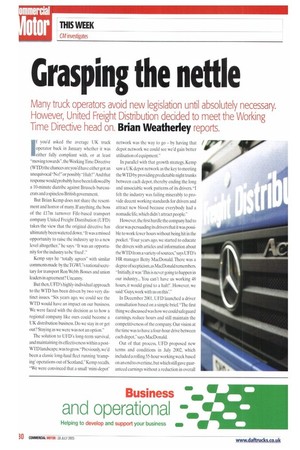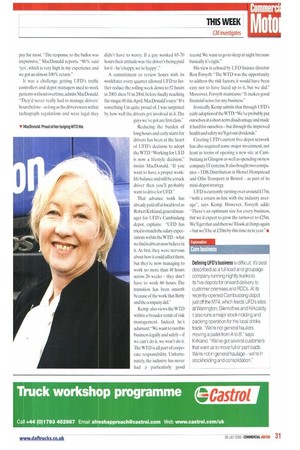Grasping the nettle
Page 30

Page 31

If you've noticed an error in this article please click here to report it so we can fix it.
Many truck operators avoid new legislation until absolutely necessary. However, United Freight Distribution decided to meet the Working Time Directive head on. Brian Weatherley reports.
If you'd asked the average UK truck operator back in January whether it was either fully compliant with, or at least "moving towards", the Working lime Directive (WTD) the chances are you'd have either got an unequivocal"No!" or possibly "Huh?" And that response would probably have been followed by a 10-minute diatribe against Brussels bureaucrats and a spineless British government.
But Brian Kemp does not share the resentment and horror of many. If anything, the boss of the 117m turnover Fife-based transport company United Freight Distribution (UFD) takes the view that the original directive has ultimately been watered down."It was a missed opportunity to raise the industry up to a new level altogether," he says "It was an opportunity for the industry to be 'fixed..."
Kemp says he "totally agrees" with similar comments made by the TGWU's national secretary for transport Ron Webb. Bosses and union leaders in agreement? Uncanny But then, UFD's highly-individual approach to the WTD has been driven by two very distinct issues. "Six years ago, we could see the WTD would have an impact on our business. We were faced with the decision as to how a regional company like ours could become a UK distribution business. Do we stay in or get out? Staying as we were was not an option."
The solution to UFD's long-term survival, and maintaining its effectiveness within a postWTD landscape, was to grow. " Previ ously, we'd been a classic long-haul fleet running `tramping' operations out of Scotland," Kemp recalls. "We were convinced that a small 'mini-depot' network was the way to go — by having that depot network we could see we'd gain better utilisation of equipment."
In parallel with that growth strategy, Kemp saw a UK depot network as the key to meeting the WTD by providing predictable night trunks between each depot, thereby ending the long and unsociable work patterns of its drivers. "I felt the industry was failing miserably to provide decent working standards for drivers and attract new blood because everybody had a nomadic life, which didn't attract people."
However, the first hurdle the company had to clear was persuading its drivers that it was possible to work fewer hours without being hit in the pocket. "Four years ago, we started to educate the drivers with articles and information about the WTD from a variety of sources," says UFD 's HR manager Betty MacDonald. There was a degree of scepticism, as MacDonald remembers. 'Initially, it was "Ibis is never going to happen in our industry... You can't have us working 48 hours, it would grind to a halt!'. However, we said:'Guys, work with us on this'."
In December 2001. UFD launched a driver consultation based on a simple brief."The first thing we discussed was how we could safeguard earnings, reduce hours and still maintain the competitiveness of the company. Our vision at the time was to have a four-hour drive between each depot," says MacDonald.
Out of that process, UFD proposed new terms and conditions in July 2002, which included a rolling 55-hour working week based on an end to overtime, but which still gave guaranteed earnings without a reduction in overall pay for most. "The response to the ballot was impressive," MacDonald reports. "86% said 'yes', which is very high in my experience and we got an almost 100% return."
It was a challenge getting UFD's traffic controllers and depot managers used to work patterns without overtime, admits MacDonald. "They'd never really had to manage drivers' hours before —as long as the drivers were within tachograph regulations and were legal they didn't have to worry. If a guy worked 65-70 hours their attitude was the driver's being paid for it— he's happy, we're happy'."
A commitment to review hours with its workforce every quarter allowed UFD to further reduce the rolling week down to 52 hours in 2003, then 51 in 2004, before finally reaching the magic 48 this April. MacDonald's says:" It's something I'm quite proud of. I was surprised by how well the drivers got involved in it. The guys we've got are first class."
Reducing the burden of long hours and early starts for drivers has been at the heart of UFD's decision to adopt the WTD."Working for LTD is now a lifestyle decision," insists MacDonald. "If you want to have a proper work/ life balance and still be a truck driver then you'll probably want to drive for UFD."
That advance work has already paid offal local level as Robert Kirkland, general manager for UFD's Cambuslang depot, explains: "UFD has tried to match the salary expectations within the WTD —what we find is drivers now believe in it. At first, they were nervous about how it could affect them, but they're now managing to work no more than 48 hours across 26 weeks — they don't have to work 60 hours. The transition has been smooth because of the work that Betty and the company did."
Kemp also views the WTD within a broader remit of risk management. Indeed, he's adamant:"We want to run this business legally and safely— if we can't do it, we won't do it, The WTD is all part of corporate responsibility. Unfortunately, the industry has never had a particularly good record. We want to go to sleep at night because basically it's right."
His view is echoed by UFD finance director Ron Forsyth: "The WTD was the opportunity to address the risk factors; it would have been easy not to have faced up to it, but we did." Moreover, Forsyth maintains: "It makes good financial sense for any business," Ironically. Kemp admits that through UFD's early adoption of the WTD"We've probably put ourselves at a short-term disadvantage and made it hard for ourselves —but through the improved health and safety we'll get our dividends" Creating UFD's current five-depot network has also required some major investment, not least in terms of opening a new site at Cambuslang in Glasgow as well as spending on new company IT systems. It also bought two companies —TDS Distribution in Hemel Hempstead and °Ills Transport in Bristol — as part of its mini-depot strategy.
UFD is currently turning over around £l7m, "with a return in-line with the industry average", says Kemp. However, Forsyth adds: "There's an optimum size for every business, but we'd expect to grow the turnover to £25m. We'll get that and then we'll look at things again — but we'll be at £20m by this time next year."•






































































































































































































